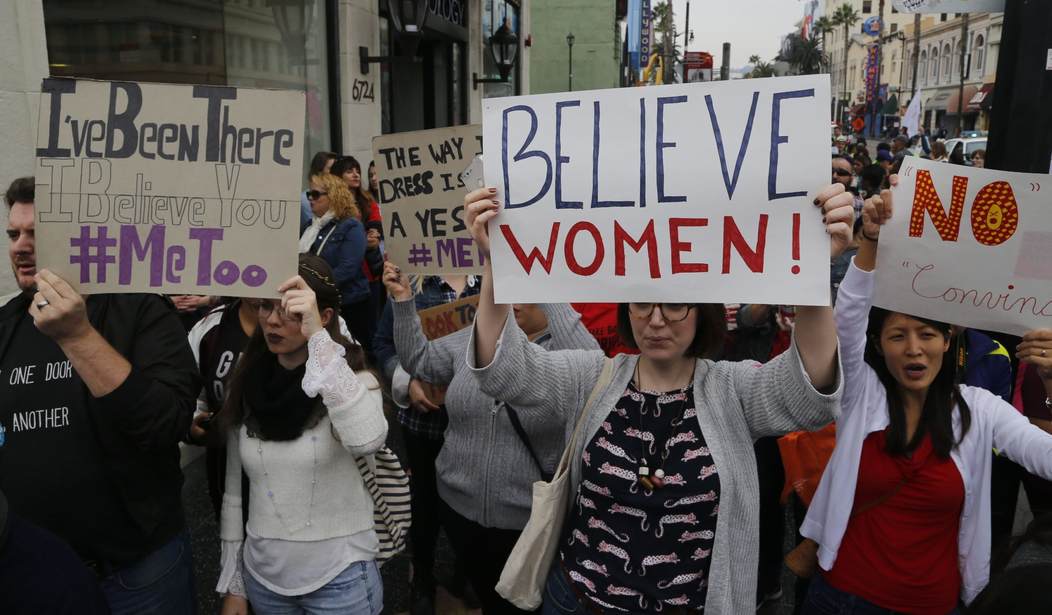On Wall Street, many men have adopted Vice President Mike Pence’s sage advice: avoid having dinner alone with any woman not your wife. There are other changes in behavior with female co-workers as well: don’t sit next to them on flights, book hotel rooms on separate floors, and avoid one-on-one meetings.
And never close your office door when meeting with a female.
It’s not just Wall Street, of course. The changes are affecting businesses nationwide in every industry.
Across Wall Street, men are adopting controversial strategies for the #MeToo era and, in the process, making life even harder for women.
Call it the Pence Effect, after U.S. Vice President Mike Pence, who has said he avoids dining alone with any woman other than his wife. In finance, the overarching impact can be, in essence, gender segregation.
Interviews with more than 30 senior executives suggest many are spooked by #MeToo and struggling to cope. “It’s creating a sense of walking on eggshells,” said David Bahnsen, a former managing director at Morgan Stanley who’s now an independent adviser overseeing more than $1.5 billion.
“Walking on eggshells” should be the phrase of the decade. On college campuses, white males are forced to be extremely — even pathologically — sensitive about what they say about race, gender, sex, gays, and any other subject the anti-free speech crowd sees fit to target them for. You can’t write or talk about race anywhere in America unless you first accept your white privilege, and then proceed to embrace the assumptions of race of activists as a starting point. Not doing so automatically brands you as a “racist.”
There are consequences to “walking on eggshells,” the most prominent being a stifling conformity of thought, a deadening of intellectual curiosity, and fear.
The #MeToo movement, now a year old, is having a dramatic effect on women in the workplace. They may have drastically reduced sexual harassment — a good thing in and of itself — but at what cost?
Now, more than a year into the #MeToo movement — with its devastating revelations of harassment and abuse in Hollywood, Silicon Valley and beyond — Wall Street risks becoming more of a boy’s club, rather than less of one.
“Women are grasping for ideas on how to deal with it, because it is affecting our careers,” said Karen Elinski, president of the Financial Women’s Association and a senior vice president at Wells Fargo & Co. “It’s a real loss.”
The practical, down-to-earth, real-world effect of #MeToo has been tragically ironic:
The changes can be subtle but insidious, with a woman, say, excluded from casual after-work drinks, leaving male colleagues to bond, or having what should be a private meeting with a boss with the door left wide open.
In this charged environment, the question is how the response to #MeToo might actually end up hurting women’s progress. Given the male dominance in Wall Street’s top jobs, one of the most pressing consequences for women is the loss of male mentors who can help them climb the ladder.
Men have to step up, she said, and “not let fear be a barrier.”
So is this a good strategy for men? Give women the cold shoulder and run away if they smile at you? An employment attorney on Wall Street says, “If men avoid working or traveling with women alone, or stop mentoring women for fear of being accused of sexual harassment, those men are going to back out of a sexual harassment complaint and right into a sex discrimination complaint.”
Those with the naive belief that treating women with respect and dignity in the workplace will be an ironclad shield against harassment or sexual assault claims are dreaming. While you should treat all women in and out of the workplace respectfully, #MeToo is not about that, or about protecting women. The movement is about the raw exercise of the power to shame, to destroy lives and careers, and to change the fundamental dynamic in male-female interpersonal relations in and out of the workplace.
In some ways, this is a good and necessary thing. But the potential for misunderstandings and false claims of harassment or assault where companies have a hair-trigger to pull against male workers makes the #MeToo movement problematic, at best, for women in the workplace.










Join the conversation as a VIP Member